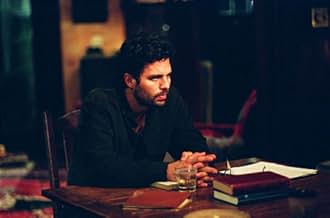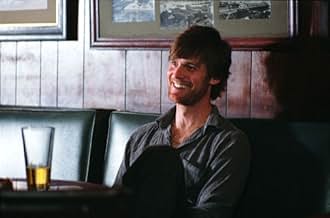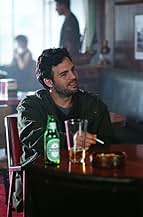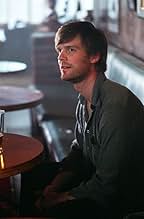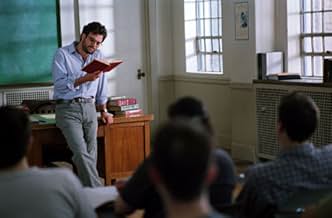AVALIAÇÃO DA IMDb
6,2/10
10 mil
SUA AVALIAÇÃO
Uma indiscrição entre dois amigos próximos destrói seus respectivos casamentos.Uma indiscrição entre dois amigos próximos destrói seus respectivos casamentos.Uma indiscrição entre dois amigos próximos destrói seus respectivos casamentos.
- Prêmios
- 2 vitórias e 4 indicações no total
- Direção
- Roteiristas
- Elenco e equipe completos
- Produção, bilheteria e muito mais no IMDbPro
Avaliações em destaque
There was a Bergmanesque quality to "We Don't Live Here Any More," recalling the passionate stories and deep psychological insights into characters in the films of the Swedish auteur filmmaker. Like Bergman, director John Curran offered a sensitive touch to the film's deliberate style of pacing and the still moments where the characters seemed lost in thought.
The story of "We Don't Live Here Any More" focuses on two married couples in adulterous relationships. The physical environments helped to convey the essence of how mismatched the individual characters were in their marriages. The characters of Jack (Mark Ruffalo) and Edith (Naomi Watts) would have seemed much more at home in the cheerful and immaculate house. By contrast, Hank (Peter Krause) and Terry (Laura Dern) would have found a better fit in the cluttered, bohemian-style home. All four performances were moving and believable. From the film's opening scene, it was easy to see how the characters were propelled to one another.
This was not a perfect film. It would have been more true to life to focus on the emotional layers of characterization instead of the sex. For the most part, the four characters seemed like good parents, and it was difficult to imagine where they would find the time to set up their trysts and be away from home for protracted periods. The genius of Bergman was to tap into those deep layers of emotional pain, which seemed remarkably absent in this film. Instead of heading out into the forest or into the car, it would have been revealing to learn more about the characters' feelings in their own homes and in their own words.
Still, after viewing "We Don't Live Here Anymore," I found myself reflecting on the characters and the relationships many days later. And that is a sign of a good film!
The story of "We Don't Live Here Any More" focuses on two married couples in adulterous relationships. The physical environments helped to convey the essence of how mismatched the individual characters were in their marriages. The characters of Jack (Mark Ruffalo) and Edith (Naomi Watts) would have seemed much more at home in the cheerful and immaculate house. By contrast, Hank (Peter Krause) and Terry (Laura Dern) would have found a better fit in the cluttered, bohemian-style home. All four performances were moving and believable. From the film's opening scene, it was easy to see how the characters were propelled to one another.
This was not a perfect film. It would have been more true to life to focus on the emotional layers of characterization instead of the sex. For the most part, the four characters seemed like good parents, and it was difficult to imagine where they would find the time to set up their trysts and be away from home for protracted periods. The genius of Bergman was to tap into those deep layers of emotional pain, which seemed remarkably absent in this film. Instead of heading out into the forest or into the car, it would have been revealing to learn more about the characters' feelings in their own homes and in their own words.
Still, after viewing "We Don't Live Here Anymore," I found myself reflecting on the characters and the relationships many days later. And that is a sign of a good film!
An ernest dose of claustrophobia
We Don't Live Here Anymore begins with two couples having a semi drunken party. At least Terry (Laura Dern), Jack's wife, is getting drunk, a thing she does pretty often. They've run out of beer and Jack (Mark Ruffalo) and Edith (Naomi Watts), who's the wife of Hank (Peter Krause) go to get some. Later that night the first fight occurs between Jack and Terry. This isn't the first time Jack has run off with Edith on little improvised errands and they've come to make Terry suspicious -- and she's right: Edith and Jack are soon getting it on outside on a blanket. The two couples' lives are intertwined. Jack and Hank work in the same college English department, Jack teaching literature and Hank creative writing, an activity at which he is not a success, though acceptance of one of his poems by The New Yorker is one of the few positive and non-adulterous events in the movie. The two men also go out on runs together -- sweaty, huffy, ridiculously competitive and un-fun slogs on deserted roads, followed by a beer at a pub. Edith and Jack continue to sneak off to have sex, Terry remains suspicious, and Hank doesn't seem to care either about Edith or about anybody but himself and his unsuccess, though being a habitual philanderer often on the prowl (mostly for girl students), he eventually he scares up some lust for Terry, who's eager for that kind of revenge once she knows what Jack is up to.
There's no question about the fact that Ruffalo, Watts, Dern, and Krause do their best to flesh out what, by the film's end, still appear to be rather undefined roles underwritten and equally unsimpatico. There's no doubt about Terry's volatility and anger and Edith's cool withdrawal and intense need. Hank is laid back and self absorbed, and in one of his typically complex portrayals of a ne'er-do-well, Mark Ruffalo as Jack combines needy, querulous, hostile, and sexy with a resultingly vivid but unappealing effect -- which one could also say for Laura Dern's energetic and committed portrayal. The actors do interesting (if somewhat unrewarding) work; they're better than the material. So are the designer, who's composed wonderful interiors, and the cinematographer, who has made them translucent and real. But this is a drama so focused on adultery that the adultery itself remains incompletely described as an experience. Where's the guilt? Where's the excitement? We Don't Live Here Anymore has too little to say about anything else in life other than the mechanisms of infidelity including the way children get caught in the crossfire. Though there is plenty of drinking and some smoking (Edith and Jack indulge in the latter secret vice after their secret sex sessions), the characters don't even seem to have time to sit down and eat and there's only the most smarmy and limited depiction of the men at work in the classroom, or their offices. For men and women of intelligence, these people show little brains and wit.
The friend I saw this movie with dwelt on the retro nature of the women's roles. This is a serious flaw because there's been no effort to show that the story material is from the Seventies. It's unlikely, perhaps nearly impossible, for two assistant professors at a college in the northwest nowadays to both have wives who do nothing but cook, clean house, and mind the kids. This is just one indication of a certain clumsiness in the story adaptations that are also slim on motivation and personality. We Don't Live Here Anymore is only a `good' movie in the sense that it's a grownup treatment of a grownup theme with a certain polish and a talented cast. But it's extremely claustrophobic without the compensation one might find in Bergman, say, of a growing intensity, of leaving one with powerful emotions. Jack and Terry and Hank and Edith may sputter and lash at one another at times, but they don't seem to know about or care about themselves or each other enough to make the viewer care too.
It's hard to describe the action, which slides from scene to scene gratuitously slipping in a shot or two from another scene, such as Jack and Edith's first sex outdoors, or cutting back and forth from one couple and house to the other. Do we have to have that? Why not do one thing at a time? This is where I love the French linear clarity of Eric Rohmer. He takes one conversation at a time. No slippery flash cut peeks at other people during a conversation. Sure, Eric Rohmer's cinema is a highly formalized version of life. But what is We Don't Live Here Anymore? All these things are artificial. There are no climaxes, and there's neither passion nor brilliance. One can't help thinking of the excitement, both emotional and intellectual, aroused by a good production of Who's Afraid of Virginia Wolf, beside which We Don't Live Here Anymore almost seems to slink away in shame. And compared to the lighthearted stimulation of watching an Eric Rohmer film, this one is more like taking a dose of castor oil.
We Don't Live Here Anymore begins with two couples having a semi drunken party. At least Terry (Laura Dern), Jack's wife, is getting drunk, a thing she does pretty often. They've run out of beer and Jack (Mark Ruffalo) and Edith (Naomi Watts), who's the wife of Hank (Peter Krause) go to get some. Later that night the first fight occurs between Jack and Terry. This isn't the first time Jack has run off with Edith on little improvised errands and they've come to make Terry suspicious -- and she's right: Edith and Jack are soon getting it on outside on a blanket. The two couples' lives are intertwined. Jack and Hank work in the same college English department, Jack teaching literature and Hank creative writing, an activity at which he is not a success, though acceptance of one of his poems by The New Yorker is one of the few positive and non-adulterous events in the movie. The two men also go out on runs together -- sweaty, huffy, ridiculously competitive and un-fun slogs on deserted roads, followed by a beer at a pub. Edith and Jack continue to sneak off to have sex, Terry remains suspicious, and Hank doesn't seem to care either about Edith or about anybody but himself and his unsuccess, though being a habitual philanderer often on the prowl (mostly for girl students), he eventually he scares up some lust for Terry, who's eager for that kind of revenge once she knows what Jack is up to.
There's no question about the fact that Ruffalo, Watts, Dern, and Krause do their best to flesh out what, by the film's end, still appear to be rather undefined roles underwritten and equally unsimpatico. There's no doubt about Terry's volatility and anger and Edith's cool withdrawal and intense need. Hank is laid back and self absorbed, and in one of his typically complex portrayals of a ne'er-do-well, Mark Ruffalo as Jack combines needy, querulous, hostile, and sexy with a resultingly vivid but unappealing effect -- which one could also say for Laura Dern's energetic and committed portrayal. The actors do interesting (if somewhat unrewarding) work; they're better than the material. So are the designer, who's composed wonderful interiors, and the cinematographer, who has made them translucent and real. But this is a drama so focused on adultery that the adultery itself remains incompletely described as an experience. Where's the guilt? Where's the excitement? We Don't Live Here Anymore has too little to say about anything else in life other than the mechanisms of infidelity including the way children get caught in the crossfire. Though there is plenty of drinking and some smoking (Edith and Jack indulge in the latter secret vice after their secret sex sessions), the characters don't even seem to have time to sit down and eat and there's only the most smarmy and limited depiction of the men at work in the classroom, or their offices. For men and women of intelligence, these people show little brains and wit.
The friend I saw this movie with dwelt on the retro nature of the women's roles. This is a serious flaw because there's been no effort to show that the story material is from the Seventies. It's unlikely, perhaps nearly impossible, for two assistant professors at a college in the northwest nowadays to both have wives who do nothing but cook, clean house, and mind the kids. This is just one indication of a certain clumsiness in the story adaptations that are also slim on motivation and personality. We Don't Live Here Anymore is only a `good' movie in the sense that it's a grownup treatment of a grownup theme with a certain polish and a talented cast. But it's extremely claustrophobic without the compensation one might find in Bergman, say, of a growing intensity, of leaving one with powerful emotions. Jack and Terry and Hank and Edith may sputter and lash at one another at times, but they don't seem to know about or care about themselves or each other enough to make the viewer care too.
It's hard to describe the action, which slides from scene to scene gratuitously slipping in a shot or two from another scene, such as Jack and Edith's first sex outdoors, or cutting back and forth from one couple and house to the other. Do we have to have that? Why not do one thing at a time? This is where I love the French linear clarity of Eric Rohmer. He takes one conversation at a time. No slippery flash cut peeks at other people during a conversation. Sure, Eric Rohmer's cinema is a highly formalized version of life. But what is We Don't Live Here Anymore? All these things are artificial. There are no climaxes, and there's neither passion nor brilliance. One can't help thinking of the excitement, both emotional and intellectual, aroused by a good production of Who's Afraid of Virginia Wolf, beside which We Don't Live Here Anymore almost seems to slink away in shame. And compared to the lighthearted stimulation of watching an Eric Rohmer film, this one is more like taking a dose of castor oil.
Not a heart-wrenching film but illuminates with precision the dynamics of friendship, marriage and adultery. It shows a potent portrait of two couples whose marriages are going to break; has an enormous power and tells some uncomfortable truths. In this movie actions have consequences that are not resolved with a hug or a cry. The four grown-ups (as well as their children who are perfectly aware of the situation) are very talented and all deliver passionate and compulsive performances. The atmosphere lingering in the air is what impressed me the most, being the flick filled with very expressive glances and electrical silences. Mark Ruffalo and Naomi Watts always very gifted.
Watch this as a double-bill with Mike Nichols' "Closer," and you very well might swear off love, relationships and marriage for a very long time, if not forever.
The last screenwriter I'd expect to write a somber, almost Bergmanesque exploration of marriage and infidelity would be Larry Gross, whose credits include "48 HRS." (1982) and "Streets of Fire" 1984) for Walter Hill and "True Crime" (1999) for Clint Eastwood.
Yet Gross has turned two Andre Dubus short stories into an engaging, albeit somewhat depressing, movie that explores marital infidelities among two couples - Jack (Mark Ruffalo) and Terry Linden (Laura Dern); and Hank (Peter Krause) and Edith Evans (Naomi Watts).
Much like the Nichols film, "We Don't Live Here Anymore" can be tough viewing, at times. Uncomfortable, even occasionally painful. But the actors make it work, often lifting it above trite moments. Director John Curran keeps things tight and gets emotionally powerful performances from them. Though, the film would have smarted more had Krause injected some rawness into his role. Hank seems too laid-back about the whole affair and Krause's performance never inches past insouciant.
Dern throws herself fully into her strongest role since "Citizen Ruth" (1996). As a wife who's apparently lost the desire of her husband and really has little interest in housework, Dern does well to keep Terry from turning into a broad caricature. She makes Terry sad without turning her pathetic. A bedroom confrontation with Jack doesn't veer into clichés only because Dern and Ruffalo bring such brutal honesty to their roles.
Watts seems to revel in playing emotionally devastated women. Here, she throws in selfishness, to boot. Watts makes it awfully difficult for us to like Edith because she's the most manipulative of the lot. That we wind up caring about her speaks highly of Watts' acting ability.
The Lindens and the Evanses might very well take narcissism to a new level. These thoroughly self-absorbed people don't really care about the infidelity. In fact, they're so blasé about it all, you wonder if anything at all would jolt them into feeling something for someone else.
When Edith asks Jack, "How do you think we'll get caught?" she's not so much worried about her husband finding about the affair than her friend, Terry. And it's in delving into the Terry-Edith dynamic that Gross' script fails. We hear that these two women are dearest friends. Yet, we never get that feeling from watching them together. In fact, Gross never really gives either Dern or Watts, two incredible talents, the chance to play off each other. Their few scenes together barely scratch the surface of any friendship Terry and Edith might have.
True, there's nothing really sympathetic about any of these four people. I doubt redemption's around the corner, either. But the way they claw at each other's emotions, occasionally fraying themselves, as they lie and cheat, and even tell the truth, to their loved ones, makes for compelling viewing.
"We Don't Live Here Anymore" shows a side of marriage that movies, certainly American movies, rarely dare to depict. Marriage isn't easy. For many, it can be terribly hard work. Sometimes, painful and difficult work. And that's what this film shows.
You can't really say you enjoyed watching this movie, but it will linger with you long after you're done watching it; when you're stuck washing dirty dishes for the umpteenth time, picking up tossed-about laundry or suddenly realizing that your lover's quirk which you once thought was endearing and cute is now just positively irritating and infuriating.
The last screenwriter I'd expect to write a somber, almost Bergmanesque exploration of marriage and infidelity would be Larry Gross, whose credits include "48 HRS." (1982) and "Streets of Fire" 1984) for Walter Hill and "True Crime" (1999) for Clint Eastwood.
Yet Gross has turned two Andre Dubus short stories into an engaging, albeit somewhat depressing, movie that explores marital infidelities among two couples - Jack (Mark Ruffalo) and Terry Linden (Laura Dern); and Hank (Peter Krause) and Edith Evans (Naomi Watts).
Much like the Nichols film, "We Don't Live Here Anymore" can be tough viewing, at times. Uncomfortable, even occasionally painful. But the actors make it work, often lifting it above trite moments. Director John Curran keeps things tight and gets emotionally powerful performances from them. Though, the film would have smarted more had Krause injected some rawness into his role. Hank seems too laid-back about the whole affair and Krause's performance never inches past insouciant.
Dern throws herself fully into her strongest role since "Citizen Ruth" (1996). As a wife who's apparently lost the desire of her husband and really has little interest in housework, Dern does well to keep Terry from turning into a broad caricature. She makes Terry sad without turning her pathetic. A bedroom confrontation with Jack doesn't veer into clichés only because Dern and Ruffalo bring such brutal honesty to their roles.
Watts seems to revel in playing emotionally devastated women. Here, she throws in selfishness, to boot. Watts makes it awfully difficult for us to like Edith because she's the most manipulative of the lot. That we wind up caring about her speaks highly of Watts' acting ability.
The Lindens and the Evanses might very well take narcissism to a new level. These thoroughly self-absorbed people don't really care about the infidelity. In fact, they're so blasé about it all, you wonder if anything at all would jolt them into feeling something for someone else.
When Edith asks Jack, "How do you think we'll get caught?" she's not so much worried about her husband finding about the affair than her friend, Terry. And it's in delving into the Terry-Edith dynamic that Gross' script fails. We hear that these two women are dearest friends. Yet, we never get that feeling from watching them together. In fact, Gross never really gives either Dern or Watts, two incredible talents, the chance to play off each other. Their few scenes together barely scratch the surface of any friendship Terry and Edith might have.
True, there's nothing really sympathetic about any of these four people. I doubt redemption's around the corner, either. But the way they claw at each other's emotions, occasionally fraying themselves, as they lie and cheat, and even tell the truth, to their loved ones, makes for compelling viewing.
"We Don't Live Here Anymore" shows a side of marriage that movies, certainly American movies, rarely dare to depict. Marriage isn't easy. For many, it can be terribly hard work. Sometimes, painful and difficult work. And that's what this film shows.
You can't really say you enjoyed watching this movie, but it will linger with you long after you're done watching it; when you're stuck washing dirty dishes for the umpteenth time, picking up tossed-about laundry or suddenly realizing that your lover's quirk which you once thought was endearing and cute is now just positively irritating and infuriating.
A serious and emotionally engaging melodrama that tells of two marriages, of love, friendship, adultery, faithfulness, parenting, and the delicate balance between being true to the spirit within and being responsible about the consequences in the real world.
Mark Ruffalo and Peter Krause play two college tutors of English literature, working away and also trying to get published in their own right in their spare time. They are close buddies and have loving, beautiful wives (Naomi Watts and Laura Dern). We have four 'ordinary people' who are far from caricatures they have sensitivities, intelligence, emotional aspiration and weakness as they struggle with their own stymied abilities to find happiness and fulfilment both for themselves and the ones they love.
We Don't Live Here Anymore looks at the reality of marriage in a less than rose-tinted light. The performances by Watts and Dern shine forth with increasing emotional intensity, and the efforts of their husbands to stage-manage some sort of acceptable compromise ricochet on the fringes of a dark despair that forever looms and threatens to engulf everyone. As the characters realise their increasingly complex shenanigans are verging on disaster, it leads them to ever deeper self-examination of their true feelings. And yet sometimes the children have a greater realisation of what's going on than do their parents. The film's closing scene ("Because I can") reminds us that the element of choice, true and ongoing, is so often lacking in marriage, sometimes even in relatively small things once marriage has been consummated, the rest becomes duty and infidelity is often driven by compulsion - so the elements of ongoing freewill (jointly and singly) can be hard to find.
This movie has been compared to Closer and rightly so it is for mature, thinking audiences who can come to terms with deep imperfections and use the depths of what it takes to be truly human to make things better (or find a way forward that has emotionally honesty). The 'moral right' will dismiss both films not so much out of a sense of superiority ('adultery never pays') but simply through lack of understanding.
The heavy-going nature of the film is alleviated by shots of rare beauty in the surrounding countryside, elegantly photographed, and by the playfulness of the several children. Watts (nearly 38 but still looking 24) and Dern (who appears older, but attractive in a very different way) each show elements of femininity that their characters are desperate to satisfy the need to be wanted and the need to be loved. To appreciate the film it is necessary to see the scenarios from both the viewpoints of the women and of the men. Everybody cares about the kids. Beyond that, the love that is expected of the spouse is at odds with the love that they try to give, so they all feel like 'objects' to their respective partners. The lack of understanding breaks down into infidelity, which (so the film might argue) can almost be a healing balm. "It's much easier living with a woman who feels loved", remarks a cuckolded husband. It's a film where no-one has all the answers (though not for want of trying) and so in some ways a testament to humanity. Sadly, many will see it as just another cynical take on dysfunctional relationships, but the open minded viewer may find a lot more, for this film is a well-made (if not exceptional) work of art that contributes more to the understanding of the human condition than any cutesy, idealised portrayal of happy families.
Mark Ruffalo and Peter Krause play two college tutors of English literature, working away and also trying to get published in their own right in their spare time. They are close buddies and have loving, beautiful wives (Naomi Watts and Laura Dern). We have four 'ordinary people' who are far from caricatures they have sensitivities, intelligence, emotional aspiration and weakness as they struggle with their own stymied abilities to find happiness and fulfilment both for themselves and the ones they love.
We Don't Live Here Anymore looks at the reality of marriage in a less than rose-tinted light. The performances by Watts and Dern shine forth with increasing emotional intensity, and the efforts of their husbands to stage-manage some sort of acceptable compromise ricochet on the fringes of a dark despair that forever looms and threatens to engulf everyone. As the characters realise their increasingly complex shenanigans are verging on disaster, it leads them to ever deeper self-examination of their true feelings. And yet sometimes the children have a greater realisation of what's going on than do their parents. The film's closing scene ("Because I can") reminds us that the element of choice, true and ongoing, is so often lacking in marriage, sometimes even in relatively small things once marriage has been consummated, the rest becomes duty and infidelity is often driven by compulsion - so the elements of ongoing freewill (jointly and singly) can be hard to find.
This movie has been compared to Closer and rightly so it is for mature, thinking audiences who can come to terms with deep imperfections and use the depths of what it takes to be truly human to make things better (or find a way forward that has emotionally honesty). The 'moral right' will dismiss both films not so much out of a sense of superiority ('adultery never pays') but simply through lack of understanding.
The heavy-going nature of the film is alleviated by shots of rare beauty in the surrounding countryside, elegantly photographed, and by the playfulness of the several children. Watts (nearly 38 but still looking 24) and Dern (who appears older, but attractive in a very different way) each show elements of femininity that their characters are desperate to satisfy the need to be wanted and the need to be loved. To appreciate the film it is necessary to see the scenarios from both the viewpoints of the women and of the men. Everybody cares about the kids. Beyond that, the love that is expected of the spouse is at odds with the love that they try to give, so they all feel like 'objects' to their respective partners. The lack of understanding breaks down into infidelity, which (so the film might argue) can almost be a healing balm. "It's much easier living with a woman who feels loved", remarks a cuckolded husband. It's a film where no-one has all the answers (though not for want of trying) and so in some ways a testament to humanity. Sadly, many will see it as just another cynical take on dysfunctional relationships, but the open minded viewer may find a lot more, for this film is a well-made (if not exceptional) work of art that contributes more to the understanding of the human condition than any cutesy, idealised portrayal of happy families.
Você sabia?
- CuriosidadesThe Irish step dance scene starts with a cutaway where the center dancer is actually a male dancer.
- Citações
[last lines]
Edith Evans: I'm not leaving you because you're unfaith Hank, I'm leaving because I was.
Hank Evans: Look, none of that matters any more. It's over. Isn't it? Isn't it, Edith?
Edith Evans: Yeah. It's over.
Hank Evans: Well then, why leave now?
Edith Evans: Because I can.
- Cenas durante ou pós-créditosSpecial Thanks To Christine & Ben Christine, Terry & Kelly Kris & Fisher
- ConexõesFeatured in The 20th IFP Independent Spirit Awards (2005)
- Trilhas sonorasJungle Warrior
Written by John Otieno
Performed by Matata
Courtesy of President Records Ltd. UK
Principais escolhas
Faça login para avaliar e ver a lista de recomendações personalizadas
- How long is We Don't Live Here Anymore?Fornecido pela Alexa
Detalhes
- Data de lançamento
- Países de origem
- Centrais de atendimento oficiais
- Idioma
- Também conhecido como
- La Tentación
- Locações de filme
- Empresas de produção
- Consulte mais créditos da empresa na IMDbPro
Bilheteria
- Orçamento
- US$ 3.000.000 (estimativa)
- Faturamento bruto nos EUA e Canadá
- US$ 2.041.014
- Fim de semana de estreia nos EUA e Canadá
- US$ 101.295
- 15 de ago. de 2004
- Faturamento bruto mundial
- US$ 3.361.213
- Tempo de duração
- 1 h 41 min(101 min)
- Cor
- Mixagem de som
- Proporção
- 2.35 : 1
Contribua para esta página
Sugerir uma alteração ou adicionar conteúdo ausente


